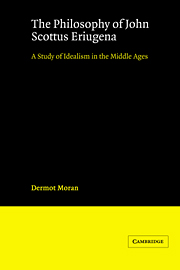Book contents
- Frontmatter
- Contents
- Preface
- Acknowledgments
- Chronology
- List of abbreviations
- 1 European intellectual culture in the ninth century
- 2 The predestination debate
- 3 Eriugena's life and early writings
- 4 The Greek awakening
- 5 The Periphyseon
- 6 Eriugena as philosopher
- 7 Eriugena's sources
- 8 Dialectic, philosophy, and the life of the mind
- 9 The meaning of human nature
- 10 Self-knowledge and self-definition: the nature of human knowing
- 11 The meaning of non-being
- 12 The meaning of nature
- 13 Eriugena's influence on later mediaeval philosophy
- 14 Conclusion
- Bibliography
- Index nominum
- Index rerum
6 - Eriugena as philosopher
Published online by Cambridge University Press: 05 June 2012
- Frontmatter
- Contents
- Preface
- Acknowledgments
- Chronology
- List of abbreviations
- 1 European intellectual culture in the ninth century
- 2 The predestination debate
- 3 Eriugena's life and early writings
- 4 The Greek awakening
- 5 The Periphyseon
- 6 Eriugena as philosopher
- 7 Eriugena's sources
- 8 Dialectic, philosophy, and the life of the mind
- 9 The meaning of human nature
- 10 Self-knowledge and self-definition: the nature of human knowing
- 11 The meaning of non-being
- 12 The meaning of nature
- 13 Eriugena's influence on later mediaeval philosophy
- 14 Conclusion
- Bibliography
- Index nominum
- Index rerum
Summary
How are we to interpret Eriugena's philosophy?
He made use of the logical and dialectical material available to the ninth century in his metaphysical discussions of the nature of essence, substance, accident, and the categories, but he stands above his contemporaries in offering a unique metaphysical system – the four divisions of nature – which introduced to the West not only a new cosmology but also the first important meontology, or study of non-being – mē on (μὴ ðν).
In the following chapters I shall argue that Eriugena's system, while seeming to provide an objective hierarchical metaphysics of order, actually presents a subjectivist and idealist philosophy, in the sense that all spatiotemporal reality is understood as immaterial, mind dependent, and lacking in independent existence; and also in the Hegelian sense, whereby all finite reality is understood to require infinite reality for its full intelligibility and completion. For Eriugena the hierarchical order of nature is in fact a product of mind, and is absorbed and transcended by the mind of the spiritually liberated person, the Pauline homo spiritualis (1 Corinthians 2.15). Of course, it is difficult to use the term “idealist” without a thoroughgoing examination of Eriugena's doctrines. In some respects Eriugena is a realist. Thus, for example, unlike Ratramnus of Corbie, Eriugena is committed to a realistic theory of universals. For him, genera and species are two ontological grades of reality and not just two logical categories.
- Type
- Chapter
- Information
- The Philosophy of John Scottus EriugenaA Study of Idealism in the Middle Ages, pp. 81 - 102Publisher: Cambridge University PressPrint publication year: 1989



